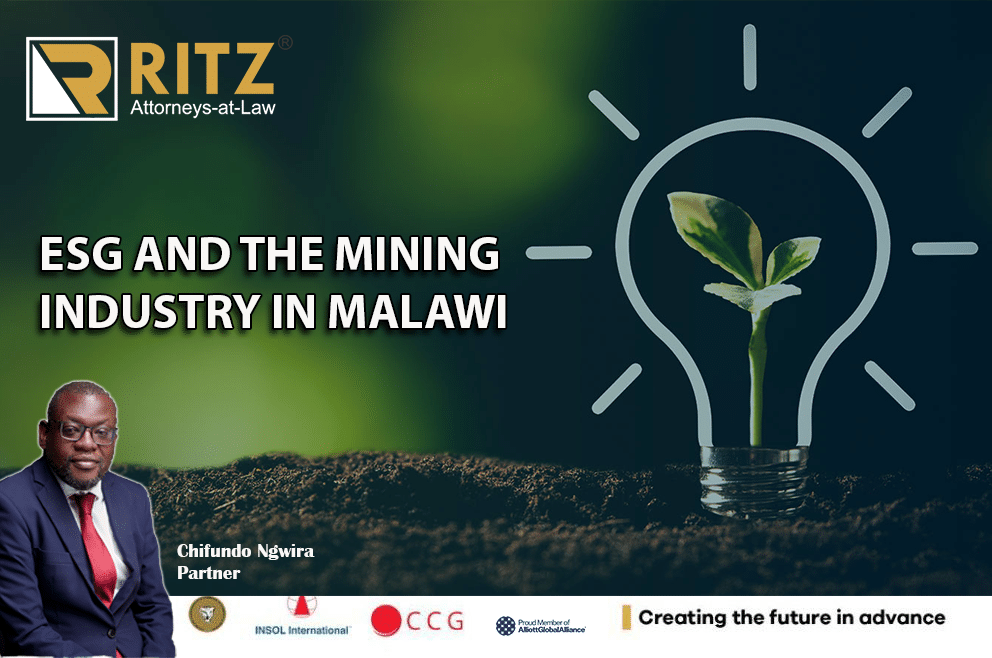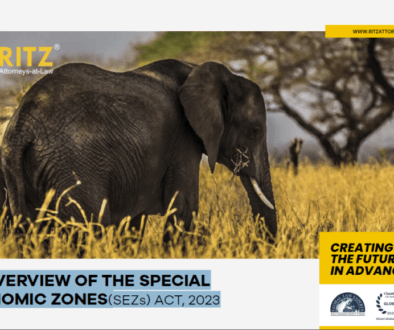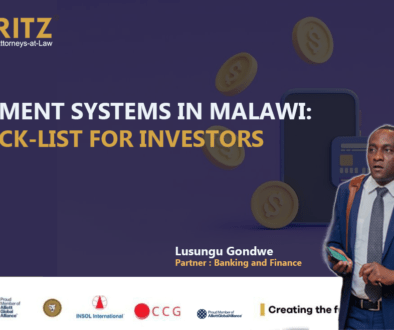INTRODUCTION
Around the world, Environmental, Social and Governance (ESG) have become the buzzword. This is because investors are interested in companies that are championing ESG. The view is that companies that prioritise ESG show that they care about their stakeholders as much as their profits.
under ESG, Environmental issues include but are not limited to, management, compliance with environmental regulations and reduction of carbon emissions.
Social issues include non-discrimination in the workplace, diversity, and inclusion of employees in the workplace, and health and safety issues at the workplace. Companies are also encouraged to empower local and surrounding communities.
As for Governance, companies must pay attention to the composition of the board of directors, shareholders, and management of the companies. Furthermore, companies are expected to have strict policies against bribery and corruption.
Despite ESG being an attraction for international investors, Africa did not pay much mind to ESG. However, in recent years, ESG has become a top priority for African companies and Malawi has not been left behind.
In Malawi, ESG is becoming more evident in the mining or extractive industry, especially in medium and large-scale mining. Under the Mines and Minerals Act of Malawi 2018 (MMA), the law has made it a legal requirement for a mining company to address issues of ESG before a medium or large-scale mining licence is issued. The MMA further requires the mining company to follow the ESG requirements throughout its mining operations and after the closure of its operations.
This note will therefore explain the MMA legal requirements that every mining company should be aware of while operating in Malawi, especially in medium-scale mining and large-scale mining.
Overview of the Requirements
Environmental
- Environmental Impact Assessment
An application for the grant of a medium-scale mining licence or large-scale mining licence must be submitted to the Registrar in the prescribed form and manner and must have attached to it documentation that the project has received approval by the Environment Management Act. A copy of the environmental impact assessment report that supports such approval must also be attached.
During the project lifespan, the Environment Protection Authority (EPA) must, in consultation with the lead agency in the mining industry, carry out periodic environmental audits of the mining project for purposes of enforcing the provisions of the Environmental Management Act.
Additionally, the owner of a project for which an environmental impact assessment has been made must keep records and annual reports which must be submitted to the EMA describing how far the project conforms in operation with the statements made in the environmental impact assessment.
- Waste Management
Further, an application for a medium-scale mining licence or large-scale mining licence must also be accompanied by the applicant’s proposed mine waste management plan.
During the lifespan of the mining project, the holder of a medium-scale mining licence or large-scale mining licence must comply with its approved mine waste management plan and must also periodically update the mine waste management plan.
- Mine Rehabilitation and Closure Plan
An application for a medium-scale or large-scale mining licence must further be accompanied by the applicant’s proposed rehabilitation and mine closure plan, which shall contain environmental rehabilitation of the land area affected by mining operations including rehabilitation throughout the life of the mine.
Social
Social Impact Assessment
Just like environmental, an application for the grant of a medium-scale mining licence or large-scale mining licence must be submitted to the Registrar in the prescribed form and manner and must have attached to it a copy of the social impact assessment report.
Employment and Training Plan
Additionally, the application must be accompanied by the applicant’s proposed employment and training plan, which must contain such information with respect to the recruitment of foreigners and the employment and training of Malawian citizens.
Once the licence is issued, the holder of such licence must comply with its approved employment and training plan and give employment preference to Malawian citizens. However, regard must be had to the maximum extent practicable consistent with efficient operations of the mining project, and in so far as such Malawian citizens are qualified to perform corresponding work without hazard to the safety of mining operations.
In terms of social inclusion and diversity, the holder of the licence must implement a non-discriminatory employment policy that gives training preference to both men and women that are lawful occupiers and owners of the mining licence area and to other persons customarily resident in neighbouring communities who have the aptitude to acquire the necessary skills and expertise.
The employment and training plan must comply with the Gender Equality Act and must also provide measures to create a working environment that is free of sexual harassment and any form of discrimination on the basis of sex.
The plan must also seek to:
- promote the participation of women in employment and training opportunities, targeting a percentage of the jobs for women including management, technical professionals, clerical, skilled labourers, and unskilled labourers; and
- promote the inclusion of people with disability in accordance with the Disability Act.
Community Development Agreements
Other social issues that the holder of a large-scale mining licence must consider are additionally, employment and training provisions that are set out in its community development agreements.
The holder of the licence must also assist, in the development of qualified communities affected by its operations in order to:
- promote sustainable development;
- enhance the general welfare and the quality of life of the inhabitants.
Under the community development, the holder of the licence must further recognize and respect the rights, customs and traditions of local communities that are consistent with the Constitution of Malawi.
A community development agreement will come into force twelve (12) calendar months after the commencement of commercial production of the mine.
Resettlement Plan
An applicant for a medium-scale mining licence or large-scale mining licence must submit a resettlement management plan attached to its mining licence application. The holder of the licence must manage any displacement of persons caused by its operations through:
- resettlement processes, if acquiring or gaining access to land causes any physical displacement; or
- compensation processes, if acquiring or gaining access to land causes economic displacement but no physical displacement.
A proposed resettlement management plan must contain such information as is prescribed in the Lands Acquisition and Compensation Act and any other written law.
The holder of a mining licence, who is required to have a resettlement management plan, must implement its approved resettlement management plan and may apply for approval to revise its plan.
Goods and Services Procurement Plan
An application for a licence must also accompany the applicant’s proposed goods and services procurement plan.
The goods and services procurement plan must demonstrate how the holder intends to assist Malawian suppliers and contractors, including those owned or operated by women, to build the capacity to supply a greater part of its project’s goods and services needs over time. However, such supplier and contractor entities must offer such terms as to prices, quantities, qualities and delivery schedules that are at least comparable to terms offered by non-Malawian contractors and suppliers to the maximum extent practicable consistent with efficient operations.
Business Development Assistance Plan
A business development assistance plan is also required to accompany the application for a license. The business development assistance plan describes how a holder of a licence intends to assist others to possess the capacity to own and operate sustainable businesses.
It applies to businesses owned or operated by:
- lawful occupiers or owners of land in the licence area;
- persons in neighbouring communities;
- women resident in the vicinity of the mining operations; and
- other Malawian citizens.
Rehabilitation and Mine Closure Plan
The rehabilitation and mine closure plan has social requirements that must be adhered to on the application for the license, during the period of operation of the mine, at the closure of the mine and during the post-closure of the mine.
These include:
- a social mitigation plan for the workforce and affected communities from the beginning of mining operations up to and including post-closure;
- mechanisms for consultation with affected and interested communities and mine workers from the commencement of operations up to and including mine closure;
- post-closure monitoring to ensure the safety and health of the affected environment and communities.
The holder of the licence is under an obligation to submit a rehabilitation and mine closure plan annually and also to periodically update and have its updated rehabilitation and mine closure plan approved.
Governance
In respect of governance, an application for the grant of a medium-scale mining licence or large-scale mining licence must have the following attachments:
- proof of the company’s incorporation or registration under the Companies Act;
- the names and nationalities of the directors or equivalent officers;
- if the company has share capital, the name of any person who is the beneficial owner of more than five per cent (5%) of the issued share capital;
- evidence that the applicant has the technical competence to fulfil the licence obligations;
- evidence that the applicant has the financial ability or a credible plan to obtain adequate financing to fulfil the licence obligations; and
- an attestation that the applicant is not barred from being granted the mining licence.
An applicant is barred from being granted such a license if a director of the company or major shareholder of the company holding a controlling interest in the company has been convicted of an offence under the MMA.
Where the director or major shareholder of the company was an officer or employee of the Mining Commission, at the time the company first applied for the grant or transfer of the licence, that company will be disqualified.
Conclusion
The MMA has brought ESG to the fore in respect of mining in Malawi. If a company is to set up a mining operation in Malawi, it must know and adhere to the requirements outlined in this note.





March 30, 2023 @ 1:44 pm
Well written Counsel Chifundo and enjoyable. I wish I could see the same push for listed companies. The draft revised listing rules currently in draft would be a good opportunity to push for more ESG visibility for listed Companied